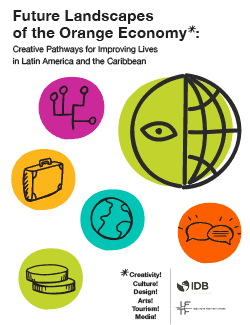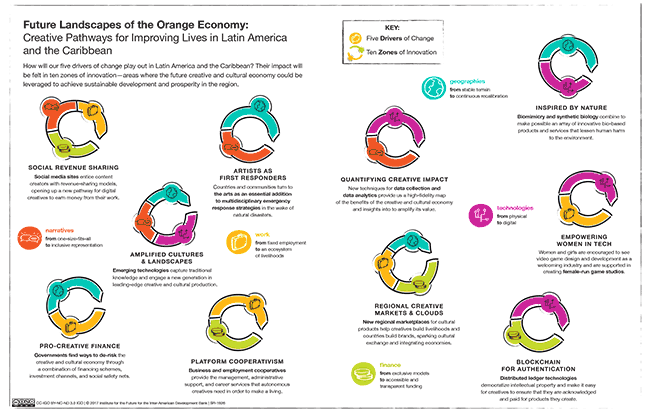Future Now
The IFTF Blog
IFTF Report IDs Ways to Leverage Creative + Cultural Economies for Sustainable Development
New IFTF Report Identifies Innovative Ways to Leverage Creative and Cultural Economies to Achieve Sustainable Development in Latin America, Caribbean
Rapid advancements in alternative business models, the proliferation of new media channels, and other technologies present opportunities for the creative and cultural class to foster greater prosperity, resilience.
 September 12, 2017, Palo Alto, Calif. — Institute for the Future (IFTF) and the Inter-American Development Bank (IDB) today released a report outlining 10 areas of innovation that governments, development organizations, companies, and communities can harness to empower creative and cultural economies to improve lives in Latin America and the Caribbean over the next decade.
September 12, 2017, Palo Alto, Calif. — Institute for the Future (IFTF) and the Inter-American Development Bank (IDB) today released a report outlining 10 areas of innovation that governments, development organizations, companies, and communities can harness to empower creative and cultural economies to improve lives in Latin America and the Caribbean over the next decade.
The new report, titled Future Landscapes of the Orange Economy: Creative Pathways for Improving Lives in Latin America and the Caribbean, concludes that the creative class in the region is strongly positioned to catalyze economic activity historically sought through manufacturing and other traditional industries. The IDB coined the term “Orange Economy” in recent years to describe creative and cultural communities and their associated industries, including design, new media, software, arts, and heritage work.
“This collaboration comes as the field of economic development faces an inflection point brought on by the accelerating digital revolution that is transforming societies and the nature of work itself,” said IFTF Executive Director Marina Gorbis. “By recognizing and embracing the innovative potential of new technologies and ways of doing business, development organizations throughout the Caribbean and Latin America can help create work, wealth, and a vibrant cultural life.”
The report identifies 10 “innovation zones” in business, technology, and the world of work that, if properly leveraged by governments, development organizations and communities, could lead to resilient orange economies and social prosperity in the region. The innovation zones are:
- Platform Cooperativism: Business and employment cooperatives provide the management, administrative support, and career services that autonomous creatives need in order to make a living.
- Artists as First Responders: Countries and communities use the arts as an essential addition to multidisciplinary emergency response strategies in the wake of natural disasters.
- Empowering Women in Tech: Women and girls are encouraged to see video game design and development as a welcoming industry and are supported in creating female-run studios.
- Amplified Cultures and Landscapes: Emerging technologies capture traditional knowledge and engage a new generation in leading-edge creative and cultural production.
- Regional Collective Markets and Clouds: New regional marketplaces for cultural products help creatives build livelihoods and countries build brands, sparking cultural exchange and integrating economies.
- Pro-creative Finance: Governments find ways to de-risk the creative and cultural economy through a combination of financing schemes, investment channels, and social safety nets.
- Inspired by Nature: Biomimicry and synthetic biology combine to make possible an array of innovative bio-based products and services that lessen human harm to the environment.
- Blockchain for Authentication: Distributed ledger technologies democratize intellectual property and make it easy for creatives to ensure that they are acknowledged and paid for products they create.
- Social Revenue Sharing: Social media sites entice content creators with revenue-sharing models, opening a new pathway for digital creatives to earn money from their work.
The report finds that by embracing rapid technological advancements in social media, artificial intelligence, crowdfunding and other business models, creative and cultural leaders can go beyond stimulating job creation and wealth to “build societies worth living in—societies that are vibrant, expressive, and joyful.”
“We have been exploring the untapped resource that is the creative and cultural economy of this region and its potential to improve lives. New business models, international communities and unparalleled levels of connectivity, new platforms for expressing ourselves and sharing stories, and more, will shape the future landscape of the orange economy,” said Trinidad Zaldivar, Chief of the Cultural, Solidarity and Creativity Affairs Division of IDB. “It is our duty to help build a favorable ecosystem where talent can thrive and contribute to the improvement of lives.”
Download the Quick Start Guide.
Download the full report:
About Institute for the Future (IFTF)
Institute for the Future is an independent, nonprofit 501(c)(3) strategic research and educational organization celebrating nearly 50 years of forecasting experience. The core of our work is identifying emerging trends and discontinuities that will transform global society and the global marketplace. Our research generates the foresight needed to create insights that lead to action and spans a broad territory of deeply transformative futures, from health and health care to technology, the workplace, learning, and human identity. Institute for the Future is based in Palo Alto, California. (www.iftf.org)
IFTF Media Contacts:
Erin Musgrave | emusgrave@affiliates.iftf.org | 530-864-7014
Jean Hagan | jhagan@iftf.org | 650-740-1386
About Inter-American Development Bank
The Inter-American Development Bank (IDB) is devoted to improving lives. Established in 1959, the IDB is a leading source of long-term financing for economic, social, and institutional development in Latin America and the Caribbean. The IDB also conducts cutting-edge research and provides policy advice, technical assistance, and training to public and private sector clients throughout the region. The IDB has been capitalizing on projects that support and demonstrate the impact of the creative and cultural industries with many operations that use culture, art, and creativity as tools for socio-economic development to improve lives. (www.iadb.org)




